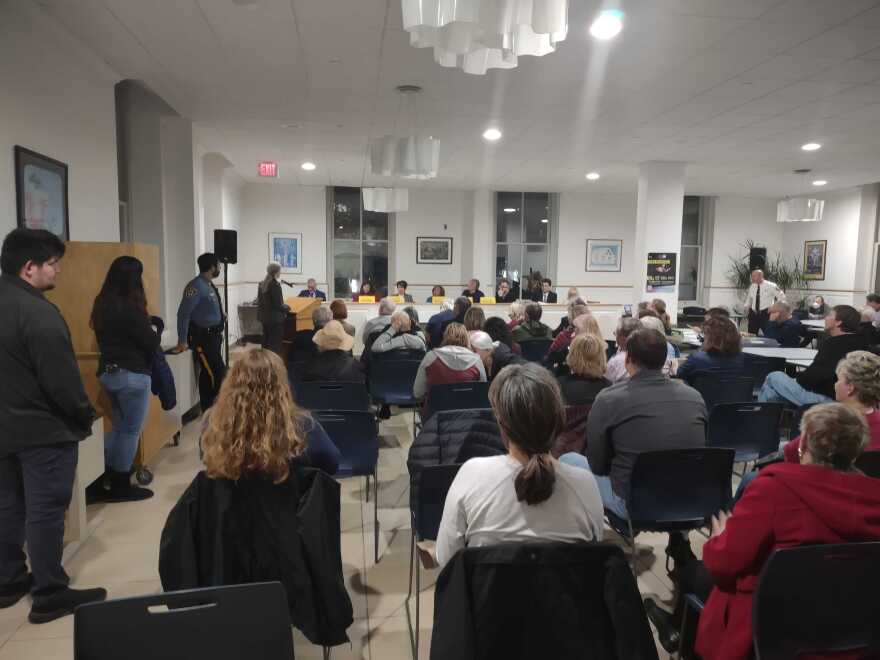HARRISBURG, Pa. — Pennsylvania Secretary of the Commonwealth Al Schmidt said his department is stepping up training and assistance for county election officials — measures that should help Northampton County as it looks to learn and improve upon its flawed 2023 general election.
In an exclusive interview with LehighValleyNews.com, Schmidt expressed confidence that Northampton County is on its way to resolving the problems that led thousands of voters to cast emergency ballots on Nov. 7.
The county's ExpressVote XL voting machines — the same kind Schmidt oversaw while a Philadelphia city commissioner — are safe and secure, and the issues were the result of human error. An audit of the digital tally confirmed the results, he said.
"It wasn't a flaw or problem or a glitch with the voting system," he said. "What we're really dealing with is something in the area of human error. That doesn't minimize the error at all. It just changes your approach to solving problems and mitigating against them occurring in the future."
The interview came days after Schmidt released a letter to state Rep. Milou Mackenzie, R-Northampton/Lehigh/Montgomery, assuring her that active steps were underway to prevent a repeat of the problems voters faced on Election Day. Earlier this month, she wrote Schmidt and Gov. Josh Shapiro requesting the state intervene in Northampton County, which has had two high-profile mistakes in its past five general elections.
"The Department feels confident the county is taking all appropriate steps to ensure a similar error does not occur in future elections. We stand ready to assist the county and the vendor in this regard," Schmidt wrote.
NorCo didn't follow best practices
Shortly after polls opened on Election Day, poll workers discovered a problem with the voting machines. In instances where voters split their votes for the retention of two Superior Court judges up for retention, they would appear reversed on the paper printout created by the machines. More than 2,100 voters had to cast emergency paper ballots while the mess was sorted out, but some polling places ran out of the emergency ballots.
Schmidt said an investigation by his office reached the same conclusion as the county — a clerk with ES&S, the county's voting machine vendor, mislabeled the Superior Court retention questions on the machine's backup paper printouts. This led the votes to appear reversed on paper, but the machines' digital tally was accurate, he said.
"It wasn't a flaw or problem or a glitch with the voting system. What we're really dealing with is something in the area of human error."Al Schmidt, Pennsylvania Secretary of the Commonwealth
In theory, mistakes like this should be caught in logic and accuracy, or L&A, testing before machines head to the polls. Northampton County did perform the mandatory minimum for these tests, but did not follow some state recommendations, Schmidt said.
The state suggests the L&A testing should be done manually, where election staff punch in multiple rounds of ballots. These selections are then compared against what the machine records. A single municipal election can have hundreds or thousands of potentially different iterations, so it's unrealistic for staff to be able to check all of them, Schmidt said. But by mixing in different votes for several rounds, there can be some confidence any errors were caught.
Northampton County, Schmidt said, did not follow this practice. Instead, it delegated the task to ES&S, which did two rounds of automated L&A testing.
Those two rounds did not split the retention votes for the two Superior Court judges, so it could not have picked up on the error. And because it wasn't done manually, it became unlikely that someone would notice the judges appeared in reverse order on the paper backup compared to the touchscreen, he said.

The stress of the day was compounded by the county's decision to send just a few dozen emergency ballots to each polling place, Schmidt said. State guidelines call for sending enough hard-copy emergency ballots to accommodate 20% of registered voters at each voting precinct, he said.
Northampton County did not follow that practice. Instead, between 20 to 50 emergency ballots were sent to each polling place, which was often not enough to meet the high demand when the voting machines were taken offline.
Changes in the works
The issues singled out by Schmidt on Tuesday have already been acknowledged by Northampton County and ES&S. Officials have already started making changes for the 2024 presidential election cycle, including in personnel. Northampton County Director of Administration Charles Dertinger — a longtime ally of County Executive Lamont McClure — resigned after the results were certified and audited.
ES&S representative Adam Carbullido said at a public meeting last month that the company will make it standard practice for all of its clients to compare the master copy of the election ballot to the paper ballot produced by the ExpressVote XL machines. That practice should catch any mislabeling on future ballots, he said.
County Registrar Christopher Cominni has vowed to make multiple improvements, including stepping up the county's L&A testing. He has also said the county will send more emergency ballots to each polling place and require that all poll workers attend training sessions each year. Previously, the county only required new poll workers and judges of election to renew their training, he said.
"I saw all sorts of chatter that this was vote-flipping — that the voter selected one candidate but the results were recorded for a different candidate. And that was not the case."Al Schmidt, Pennsylvania Secretary of the Commonwealth
In the interview and in his letter to Mackenzie, Schmidt said the state is looking to step up its game, too. Given the problems Northampton County is facing, it will revisit its guidance on L&A testing and the importance of performing the tests manually, he said.
But the state also is creating a training office for county election officials. Most errors that popped up across the state this year were printing errors or typos, he said. A common thread appears to be high levels of turnovers. The 2020 election saw veteran election officials retire across the state, and some counties are still experiencing growing pains, he said.
"There's a pretty direct correlation to human errors being made," Schmidt said. "Someone could be the registrar of wills for 20 years and find out in September they're going to be running the election."
It's essential, he said, that these issues get ironed out as each error strikes a blow to voter confidence, he said. While Northampton County's error was serious, the real danger is from bad-faith actors exploiting relatively benign mistakes to challenge the integrity of the democratic process, he said.
"I saw all sorts of chatter that this was vote-flipping — that the voter selected one candidate but the results were recorded for a different candidate," Schmidt said. "And that was not the case. We have not seen a single case of that in any election in Pennsylvania. Period."


